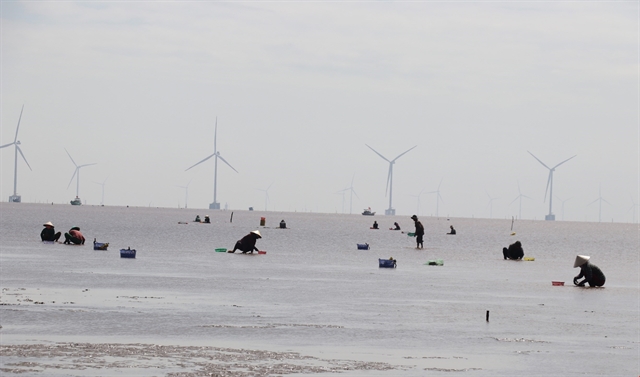 Economy
Economy

.JPG)
|
| The NESCAFÉ Plan stands as a flagship example of Nestlé Vietnam's sustainability efforts, aiming to regenerate and revitalize ecosystems for a greener future. — Photo courtesy of the firm |
HÀ NỘI — In alignment with Việt Nam's commitment to sustainable development, Nestlé Vietnam is among the companies leading the charge in promoting green consumption habits among consumers and businesses alike.
Through innovative product development, strategic partnerships and comprehensive consumer education, the company is fostering a green future for the nation.
As Việt Nam accelerates its commitment to a sustainable and low-carbon economy, green consumption is emerging not only as a social imperative but also a key driver of business innovation and competitiveness.
In recent years, the Vietnamese Government has taken clear steps to promote sustainable development, most notably through the National Green Growth Strategy for 2021–30, with a vision to 2050.
The strategy places green consumption at the centre of economic transformation, calling for a shift in both production and consumption habits in order to reduce carbon emissions and mitigate environmental impacts.
These policy moves have created a fertile environment for businesses to rethink traditional models and adopt new approaches that not only protect the planet but also respond to evolving consumer expectations.
Consumers, particularly younger demographics in urban areas, are increasingly demanding products that are environmentally friendly, responsibly sourced, and transparently produced. For companies like Nestlé, this has presented both a challenge and an opportunity to align commercial growth with sustainability goals.
.jpg)
|
| Beyond sustainable production, businesses must play a role in shifting consumer behavior and raising public awareness about environmental protection. — Photo courtesy of the firm |
Nestlé Vietnam, operating under the global company’s philosophy of 'Creating shared value', has integrated sustainability across its operations - from sourcing and production to packaging and consumer engagement. The company has made substantial progress in reducing its environmental footprint and helping its partners and consumers do the same.
Speaking at a recent sustainability forum in HCM City, Khuất Quang Hưng, Nestlé Vietnam’s Deputy General Director in charge of External Affairs, Communication and Sustainability, said the company views green consumption not as a marketing tool but as a long-term commitment to Việt Nam’s development agenda.
“Our packaging strategy is built on five pillars: reducing virgin plastic, designing for reuse, eco-design, supporting recycling, and investing in innovative technologies. These are not isolated actions but part of a holistic approach to environmental stewardship,” he said.
According to the company, nearly 95 per cent of its packaging in Việt Nam is already recyclable or reusable, putting it well ahead of many peers in the industry. Efforts such as replacing plastic straws with paper alternatives in popular products like MILO have already removed millions of single-use plastic straws from circulation. The switch to paper straws alone is estimated to eliminate more than 16 million plastic straws each year in Việt Nam.
But packaging innovation is only one part of the story. Nestlé Vietnam has also turned its attention upstream, working closely with farmers and suppliers to ensure sustainability from the source. The company’s flagship NESCAFÉ Plan, implemented in Việt Nam since 2011, is a prominent example of sustainable agriculture in practice.
Through the programme, more than 355,000 coffee farmers have received training in sustainable farming techniques. Over 74 million high-yield, climate-resilient coffee seedlings have been distributed, supporting both environmental and economic sustainability for local communities.
The NESCAFÉ Plan also incorporates principles of regenerative agriculture, aiming to restore soil health, reduce reliance on chemical inputs, and improve biodiversity. Farmers participating in the program have reported up to 40 per cent reductions in water usage, as well as significant declines in pesticide and fertiliser use. In many cases, their incomes have increased because of improved efficiency and access to better markets.
These achievements have not gone unnoticed. Nguyễn Đỗ Anh Tuấn, Director of the International Co-operation Department under the Ministry of Agriculture and Environment and Head of the Partnership for Sustainable Agriculture in Vietnam (PSAV) Secretariat, noted Nestlé’s longstanding contributions to the country’s green transition.
“Over the past 30 years, Nestlé has played an active role in promoting sustainable farming. Programmes like the NESCAFÉ Plan have helped position Vietnamese coffee on the world stage, while supporting farmers to adopt advanced, environmentally friendly practices,” he said.
Beyond agriculture and packaging, Nestlé Vietnam is also investing heavily in consumer education and behaviour change - an often-overlooked but essential part of achieving green consumption at scale.
Since early 2024, the company has partnered with local authorities, schools, and non-governmental organisations to run awareness campaigns on issues like plastic waste, sorting and recycling, and low-carbon lifestyles.
Among the most notable initiatives are 'Say no to single-use plastics' and 'Collect and sort used packaging', both of which target households and young consumers. Through these programmes, Nestlé aims to foster lasting behaviour changes that extend beyond its own customer base, contributing to a broader shift in societal attitudes toward consumption.
In parallel, Nestlé has been working with suppliers and partners in its value chain to support emissions reduction and green transformation. The company has provided training and tools to help suppliers measure their greenhouse gas emissions and identify ways to reduce them.
This not only strengthens the entire supply chain’s environmental credentials but also helps Vietnamese companies become more competitive in international markets, where sustainability standards are increasingly stringent.
Nestlé Vietnam is also a founding member of the Packaging Recycling Organisation Vietnam (PRO Vietnam), a coalition of businesses working together to improve waste collection and recycling infrastructure across the country. The company’s active role in such alliances reflects its belief that no single actor can achieve sustainability alone - partnership is key.
For three consecutive years, from 2021 to 2023, Nestlé Vietnam has been recognised as the most sustainable company in Việt Nam in the manufacturing sector, an accolade awarded by the Việt Nam Business Council for Sustainable Development. The recognition underscores the company’s consistent leadership in aligning business objectives with environmental and social impact.
While challenges remain - such as building a more robust recycling infrastructure nationwide and making sustainable products more affordable - Nestlé Vietnam’s efforts demonstrate how large multinationals can contribute meaningfully to national priorities. In doing so, they not only meet regulatory expectations and consumer demands but also future-proof their operations in a rapidly changing world.
As Việt Nam deepens its integration into global supply chains and faces increasing pressure to decarbonise, the importance of green consumption will only grow. In this context, companies like Nestlé serve as both an example and a catalyst, showing that the path to a greener future lies in bold commitments, transparent action and shared value creation.
“In the end, sustainability is not about doing less harm - it’s about doing more good,” Hưng added.
“And that starts with changing the way we consume, produce, and think about our role in society.”